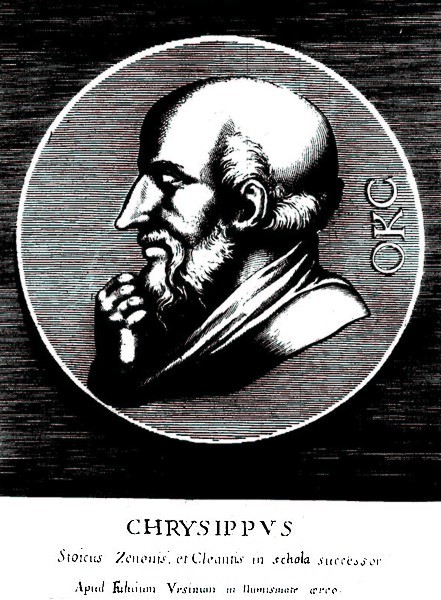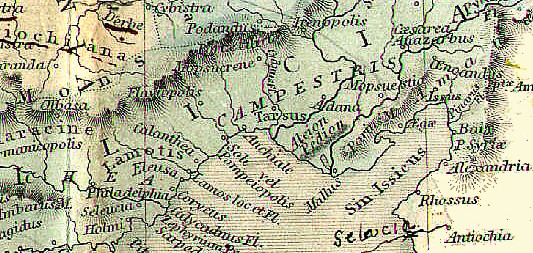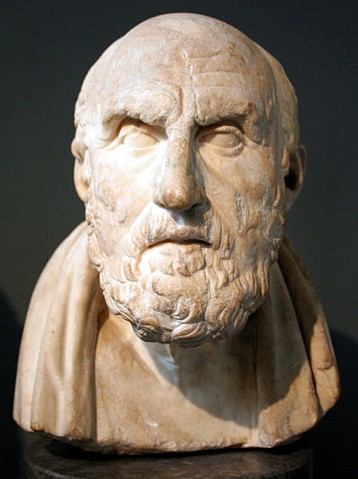Lessico
Crisippo

da
Veterum illustrium philosophorum etc. imagines (1685)
di Giovanni Pietro Bellori (Roma 1613-1696)
Filosofo stoico, nato intorno al 281 aC a Soli, o a Tarso, ambedue in Cilicia, nell’attuale Turchia. Discepolo di Arcesilao, fu iniziato allo stoicismo da Cleante e ad Atene guiḍ la scuola stoica. All'insegnamento orale e scritto dedic̣ tutta la sua vita e fu autore di un sistema di logica che riscosse l'ammirazione degli antichi. Disserṭ anche di problemi etico-metafisici.
Della sua copiosissima produzione, oltre 700 opere, ci rimangono solo frammenti, raccolti da Arnim in Stoicorum veterum fragmenta, pubblicato a Lipsia da Teubner tra il 1903 e il 1905. La maggior parte del materiale riguarda Crisippo, che si spense ad Atene intorno al 208 aC.



Roman
marble bust of Chrysippus
Roman copy of Greek original 3rd/2nd century
BC
on display in the British Museum, London.
Chrysippus of Soli (c. 280 – c. 207 BC) was Cleanthes' pupil and the eventual successor as the head of stoic philosophy. Honoured as the second founder of Stoicism, he initiated the success of Stoicism as the one of the most influential philosophical movements for centuries in the Greek and Roman world.
Little is known about Chrysippus' childhood except that he grew up in the neighborhood of Tarsus, where he may have been exposed to philosophical teachings. He moved to Athens to study philosophy after losing substantial inherited property through legal contrivance. Chrysippus then went on to become Cleanthes' pupil after being attracted to the Stoic master's loyalty to Zeno of Citium.
A
prolific writer (he is said to rarely have gone without writing 500 lines a
day) and debater, Chrysippus would often take both sides of an argument,
drawing criticism from his followers. Of his over 700 written works, none
survive, save a few fragments embedded in the works of later authors like
Cicero![]() ,
Seneca
,
Seneca![]() and others.
and others.
Chrysippus is said to have given wine to his donkey, and then died of laughter after seeing it attempt to eat figs, although the story is dubious.
Most of Chrysippus' ideology is shaped by his brief education with Zeno and later from Arcesilaus and Aristo of Chios. His later beliefs, however, were shaped by the teachings of Cleanthes, whose doctrines Chrysippus steadfastly believed in, but was displeased by the means chosen to teach the message. Chrysippus vowed to change that due to the effect it was having on the Stoa.
Chrysippus believed virtue to be a quality of the soul, and that virtue, soul and body were all intertwined. He taught that harmony is necessary for all three to co-exist in a healthy state. He also asserted that nobility must be achieved, and not assumed at birth due to the status or heritage of the individual. Since we all come from the same divine origin, Chrysippus explained, nobility can be achieved only through the demonstration of virtue. Chrysippus held that an individual should fervently strive to attain a level of altruism and goodwill towards society, in order to maintain a good balance of the social order. For Chrysippus, hero-worship and praise was not an attractive feature in an individual; humanitas (sympathizing, reasoning, and intelligence) were by far more important to him. It was preached by the Stoic that humans should strive to differ from animals by perfecting the characteristics that define us from them: temperance, knowledge, valour, and truthfulness.
A principle of Stoic philosophy is that the Universe is a cosmos. This led Chrysippus to a few conclusions:
Logos (universal reason) is shaped by nature and society.
Pneuma, is the sustaining element that guides individual growth and creates motion in the cosmos.
This "motion" is created by the in and out activity of Tonos, or tension.
It is believed that Chrysippus dedicated a large portion of his writings, on the subject of logic, specifically, propositional logic.
Though many Stoic philosophers might not agree with the modern definition of fatalism, Chrysippus held that somewhat, all things happen due to fate. He also held the slight variation of the concept: The past is unchangeable and things that have a possibility of occurring do not necessarily have to occur, but can happen. Similarly, all things that are fated to happen, take place in a realistic order (for e.g., the sowing must occur prior to the reaping). He also taught the necessity of evil due to its interdependence to its counterpart: goodness; and that some evils are the outcome of some goods:
"There could be no justice, unless there were also injustice; no courage, unless there were cowardice; no truth, unless there were falsehood."
Chrysippus
Dictionary
of Greek and Roman biography and mythology
William Smith, Boston, 1867
Chrysippus (Χρύσιππος), a Stoic philosopher,
son of Apollonius of Tarsus, but born himself at Soli in Cilicia. When young,
he lost his paternal property, for some reason unknown to us, and went to
Athens, where he became the disciple of Cleanthes, who was then at the head of
the Stoical school. Some say that he even heard Zeno, a possible but not
probable statement, as Zeno died B.C. 264, and Chrysippus was born B. C. 280.
He does not appear to have embraced the doctrines of the Stoics without
considerable hesitation, as we hear that he studied the Academic philosophy,
and for some time openly dissented from Cleanthes. Disliking the Academic
scepticism, he became one of the most strenuous supporters of the principle
that knowledge is attainable and may be established on certain foundations.
Hence, though not the founder of the Stoic school, he was the first person who
based its doctrines on a plausible system of reasoning, so that it was said,
"if Chrysippus had not existed, the Porch could not have been" (Diogenes
Laertius![]() vii. 183), and among the
later Stoics his opinions had more weight than those of either Zeno or
Cleanthes, and he was considered an authority from which there was no appeal.
He died B. C. 207, aged 73 (Laert. 1. c.), though Valerius Maximus
vii. 183), and among the
later Stoics his opinions had more weight than those of either Zeno or
Cleanthes, and he was considered an authority from which there was no appeal.
He died B. C. 207, aged 73 (Laert. 1. c.), though Valerius Maximus![]() (viii. 7. § 10) says,
that he lived till past 80. Various stories are handed down by tradition to
account for his death — as that he died from a fit of laughter on seeing a
donkey eat figs, or that he fell sick at a sacrificial feast, and died five
days after.
(viii. 7. § 10) says,
that he lived till past 80. Various stories are handed down by tradition to
account for his death — as that he died from a fit of laughter on seeing a
donkey eat figs, or that he fell sick at a sacrificial feast, and died five
days after.
With regard to the worth
of Chrysippus as a philosopher, it is the opinion of Ritter that, in spite of
the common statement that he differed in some points from Zeno and Cleanthes (Cicero![]() Acad. ii. 47), he was
not in truth so much the author of any new doctrines as the successful
opponent of those who dissented from the existing Stoic system, and the
inventor of new arguments in its support. With the reasoning of his
predecessors he appears to have been dissatisfied, from the story of his
telling Cleanthes that he only wished to learn the principles of his school,
and would himself provide arguments to defend them. Besides his struggles
against the Academy, he felt very strongly the dangerous influence of the
Epicurean system; and in order to counterbalance the seductive influence of
their moral theory, he seems to have wished in some degree to popularize the
Stoic doctrine, and to give to the study of ethics a more prominent place than
was consistent with his statement, that physics (under which he included the
whole science of theology, or investigations into the nature of God) was the
highest branch of philosophy. This is one of the contradictions for which he
is reproached by Plutarch
Acad. ii. 47), he was
not in truth so much the author of any new doctrines as the successful
opponent of those who dissented from the existing Stoic system, and the
inventor of new arguments in its support. With the reasoning of his
predecessors he appears to have been dissatisfied, from the story of his
telling Cleanthes that he only wished to learn the principles of his school,
and would himself provide arguments to defend them. Besides his struggles
against the Academy, he felt very strongly the dangerous influence of the
Epicurean system; and in order to counterbalance the seductive influence of
their moral theory, he seems to have wished in some degree to popularize the
Stoic doctrine, and to give to the study of ethics a more prominent place than
was consistent with his statement, that physics (under which he included the
whole science of theology, or investigations into the nature of God) was the
highest branch of philosophy. This is one of the contradictions for which he
is reproached by Plutarch![]() , whose work De
Stoicorum Repugnantiis is written chiefly against his inconsistencies,
some of which are important, some merely verbal. The third of the ancient
divisions of philosophy, logic (of the theory of the sources of human
knowledge), was not considered by Chrysippus of the same importance as it had
appeared to Plato
, whose work De
Stoicorum Repugnantiis is written chiefly against his inconsistencies,
some of which are important, some merely verbal. The third of the ancient
divisions of philosophy, logic (of the theory of the sources of human
knowledge), was not considered by Chrysippus of the same importance as it had
appeared to Plato![]() and Aristotle
and Aristotle![]() ; and he followed the
Epicureans in calling it rather the organum of philosophy than a part of
philosophy itself. He was also strongly opposed to another opinion of
Aristotle, viz. that a life of contemplative solitude is best suited to the
wise man — considering this a mere pretext for selfish enjoyment, and
extolling a life of energy and activity. (Plut. de Stoic. Rep. ii.)
; and he followed the
Epicureans in calling it rather the organum of philosophy than a part of
philosophy itself. He was also strongly opposed to another opinion of
Aristotle, viz. that a life of contemplative solitude is best suited to the
wise man — considering this a mere pretext for selfish enjoyment, and
extolling a life of energy and activity. (Plut. de Stoic. Rep. ii.)
Chrysippus is pronounced by Cicero (de Nat. Deor. iii. 10) "homo sine dubio versutus, et callidus," and the same character of quickness and sagacity was generally attributed to him by the ancients. His industry was so great, that he is said to have seldom written less than 500 lines a-day, and to have left behind him 705 works. These however seem to have consisted very largely of quotations, and to have been undistinguished for elegance of style. Though none of them are extant, yet his fragments are much more numerous than those of his two predecessors. His erudition was profound, he is called by Cicero (Tusc. i. 45) "in omni historia curiosus," and he appears to have overlooked no branch of study except mathematics and natural philosophy, which were neglected by the Stoics till the time of Posidonius. His taste for analysing and refuting fallacies and sophistical subtleties was derived from the Megarians (Pint. Stoic. Rep. x.): in the whole of this branch of reasoning he was very successful, and has left numerous treatises on the subject, e.g. περὶ τῶν πέντε πτωσέων, περὶ λεξέων, κ. τ. λ. (Diog. Laert. vii. 192, 193.) He .was the inventor of the kind of argument called Sorites. (Chrysippi acervus, Pers. Sat. vi. 80.) In person he was so slight, that his statue in the Cerameicus was hidden by a neighbouring figure of a horse; whence Carneades, who, as head of the Academy, bore him no great goodwill, gave him the soubriquet of Κρύψιππος.
(Orelli, Onom. Tull. ii. p. 144; Hitter, Ges chichte der Phil. xi. 5, 1; Brucker, Hist. Crit. Phil. II. ii. 9, 2 ; Baguet, de Clirysippi vita, doctrina et reliquiis Comment. Lovan. 1822; Petersen, Philo sophiae Chrysippeae Fundamenta, Alton. 1827.) The general account of the doctrine of the Stoics is given under zeno. [G. E. L. C.]